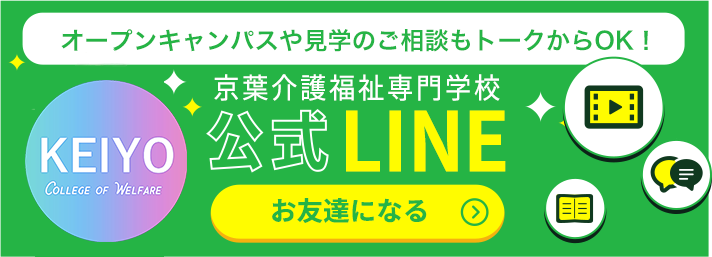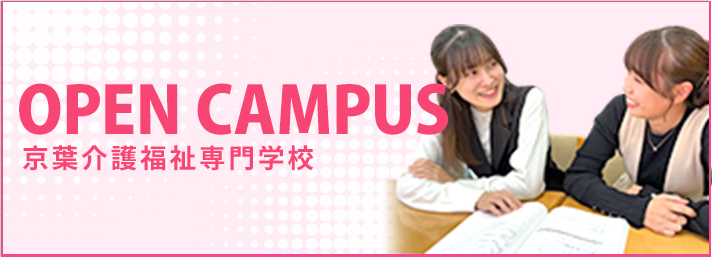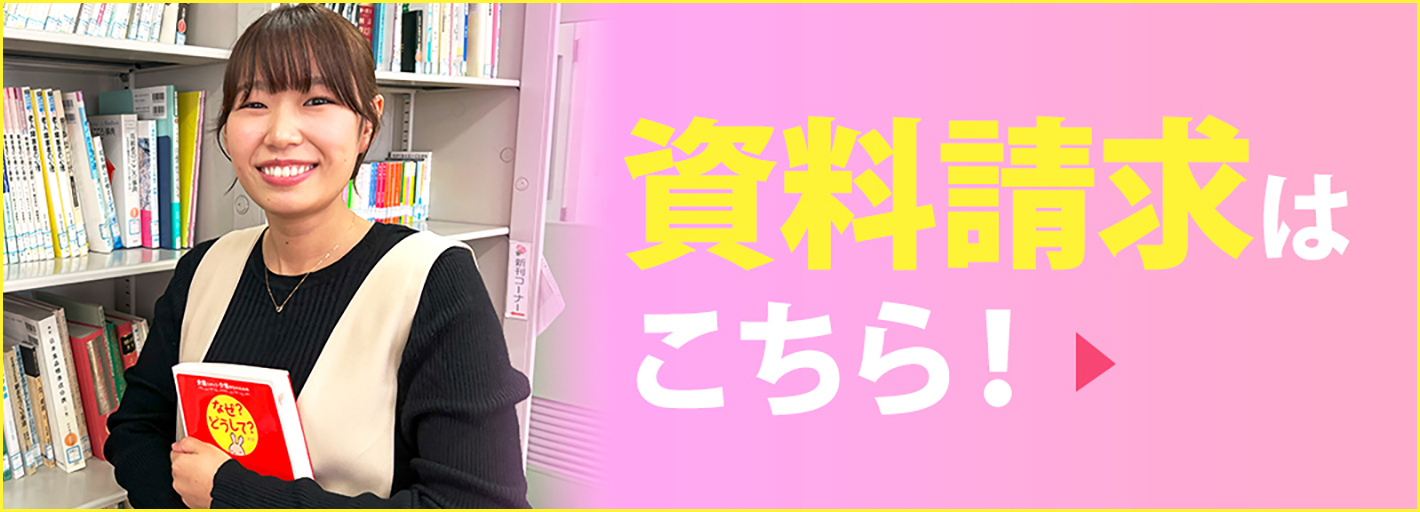
Admission information
For international students
OPEN CAMPUS
International students are very much welcome!
If you are interested , Please join us for a trial class. we also provide briefing session to answer any questions you may have.
Join NowLearn about Japanese nursing care
that is
recognized worldwide
Your country will soon enter an aging society
By 2025, most major Asian countries will experience demographic aging. Explore nursing care techniques in Japan, which has been addressing aging since 1970, and contribute to both Japan and your home country!

Can I work in Japan?
With a "Nursing Care" Status of
Residence,
You can work in Japan!
By studying at Keiyo Nursing Care and Welfare College, you can secure employment in the field of nursing care.
Status of Residence: "Nursing Care"
● How to Obtain Status of Residence?
While studying at Keiyo Care and Welfare College,
①Successfully complete 2 years of classes and on-site training.
②Pass the national exam held in January of the second year.
● How to Secure Employment?
Keiyo Care Welfare College will provide support you'll need.
〈After obtaining the visa〉
・Visa renewal available.(Visa renewal needed after the first year, then 3 to 5 years)
・You can in and out of Japan while the visa is still in valid.
・Your family may be able to stay in Japan while you hold this visa.
Process of obtaining status of residence
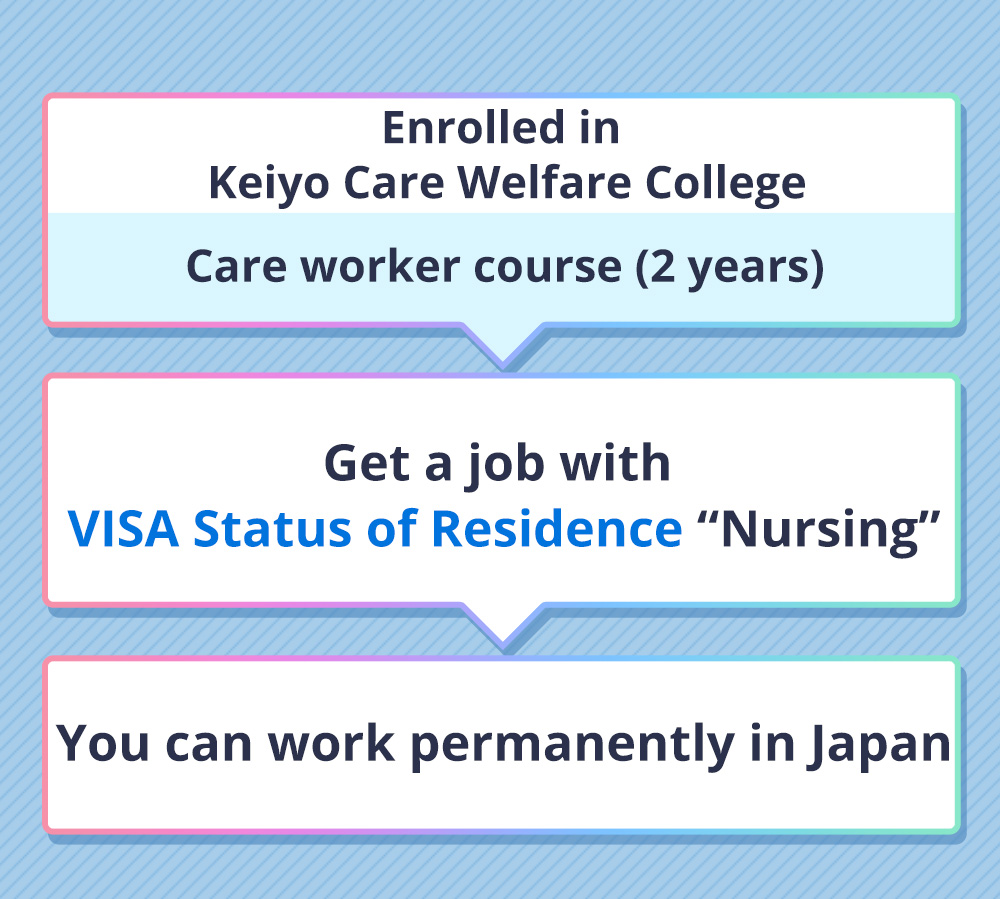
National Examination for Certified Care Workers and Transitional Measures
- Graduates of the training facility (Keiyo Care Welfare College) will be eligible to take the national exam.
- For those who graduate from the training facility (Keiyo Care Welfare
College),
(a) They will be granted a certified care worker qualification for five years after graduation.
(b) A person who has been granted a certified care worker qualification under
(1) has passed the national examination within five years, or
(2) has been engaged in nursing care work for five consecutive years after graduation.
In principle, the qualification is valid for five years. Even after this period, you will continue to have a certified care worker qualification.
Even if you fail to satisfy either (a) or (b) within five years after graduation, you are still eligible to take the National Examination for Certified Care Workers, and by passing the national exam, you can obtain the Certified Care Worker qualification.
*Transitional measures until graduation on March 31, 2027
For details, please refer to the Ministry of Health, Labor and Welfare's Acceptance of New Foreign Human Resources in the Nursing Care Field (Status of Residence "Specified Skilled Worker").
Message from graduates
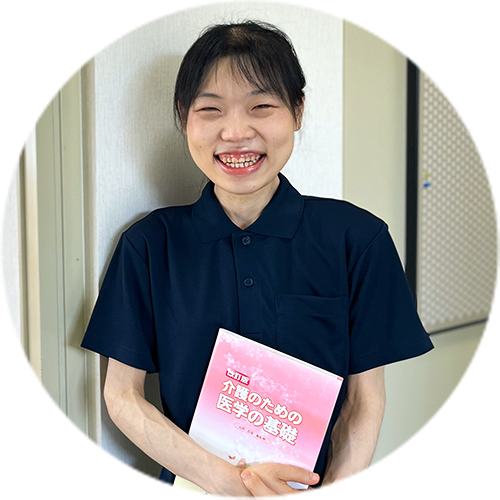
 Choi Moon-jung
Choi Moon-jung
From Republic of Korea/Graduated in 2020
Working in "Visiting care Ayumi"
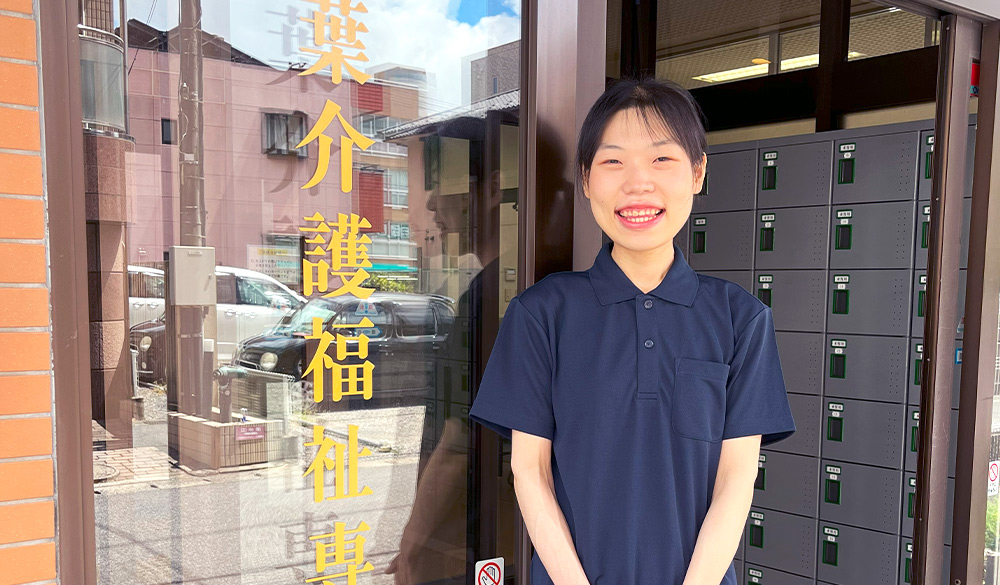
Q
Please tell us about your current job.
A
I work as a home care provider for people with disabilities. We also provide time for hobbies, which is not often seen in home-visit care for the elderly. We prepare meals, provide daily assistance, offer physical care, and also provide medical care such as suction.
Q
What made you decide to work in nursing care?
A
My father is actually disabled. When I was 3 years old, he suffered a brain hemorrhage and is now paralyzed on his right side. I have been caring for him for a long time and have been interested in the welfare field. When I was in middle school, I joined a volunteer organization and was active. However, in the Republic of Korea, there is a strong image that nursing care work is done by older women as a second career in life, and it does not feel like it is a job for young people. I also had no intention of working in nursing care myself. When I was in the third year of junior high school, I became interested in Japan after studying Japanese, so I went on to a high school where I could study Japanese more. There, my teacher told me, "A Japanese employment/admission fair will be held in Korea, would you like to go?" When I went there, I learned that young people also work in nursing care in Japan. After doing some more research, I became really interested in the topic, and I also wanted to work as a care worker in Japan. so I decided to study abroad in Japan.
Q
How did you find out about Keiyo Care and Welfare College?
A
Actually, I first went to see the largest school near Chiba Station. However, I was told that I would not be able to enroll unless I had a record of attending a Japanese language school for at least three months. Since I was already able to speak Japanese to a certain extent, I thought it would be a waste of time and money, so I looked into other good schools and found Keiyo Care and Welfare College.
Q
Why did you choose Keiyo Care and Welfare College?
A
First of all, it has good access from the station. I think this is quite important. The less time I spend commuting to school, the more I can concentrate on studying. I also thought the photos of the training room on the website were very nice. I thought that I could enjoy studying in this environment. This was the biggest one.
Q
What did you enjoy most about your school life?
A
I always liked going to school, so I enjoyed every day. Due to the coronavirus pandemic, I was only able to attend for one year. but I enjoyed the sign language class the most. I've always liked studying languages, but it was refreshing to learn that sign language has a different way of thinking than spoken language. The teacher was very kind and the class was interesting.
Q
Have you ever had a hard time?
A
Writing a training diary. The training was great because I was able to experience a nursing care setting and I really learned a lot, but I had to write a training diary every day. Since I'm a foreigner, it took me twice as long as other people, and that was the hardest part. When I looked back on it later, I was able to recall that something like this had happened, so I was glad that I had worked hard every day, but at the time it was really tough.
Q
Did your teacher support you with your difficulties?
A
Honestly, I might not have been able to get through it without teachers. I told them that I was weak, and there were times when I cried because I thought what would happen if I couldn't do it. There were times when I worried for about an hour on days when my teachers were making rounds, so I might not have been able to graduate without their support. They encouraged me and told me it was okay, and gave me advice on what I should do when making assessments and care plans, and they provided me with a variety of on-site support.
Q
What did you do the most in your school life?
A
I was studying steadily at school, so studying for the national exam came naturally to me, so I'm really glad I did my best.
Q
Did you receive any support from your teacher regarding your studies?
A
Even the smallest questions were answered politely. and the teachers did their best to research things they didn't understand on the spot, and the next day they told me, "I looked it up, and this is what I found." The teachers were very kind, and when I had questions about things other than the exam, they always answered politely, which was very helpful.
Q
Is what you learned at Keiyo Care and Welfare College useful in the actual field?
A
I don't think I would have been able to work if I hadn't studied here. School taught me the basics well, so I can apply them in the field. They also taught me practical tips and tricks, which was also helpful.
Q
Do you have any future goals?
A
I think Japan is more advanced than the Republic of Korea when it comes to welfare. I would like to learn various technologies and systems in Japan, and eventually improve the welfare of the Republic of Korea when I return there. If possible, I would like to be a bridge between Korea and Japan in the welfare field.
Q
Message to international students aiming to become care workers
A
I think there are a lot of really difficult things going on. You may feel a language barrier, such as terminology that is difficult even for Japanese people, and the names of muscles and bones in the body. But if you have passion, purpose, and heart, anything is possible! So, please don't forget your goal and do your best with a strong heart.
International student recruitment guidelines
Tuition fee list
About payment of tuition fees
- 1. Please pay the admission fee, tuition fee, and practical training fee (Admission Procedure I) within 15 days after the announcement of the results.
- 2. Miscellaneous fees and educational enrichment fees (admission procedure II) are approximate amounts.
- 3. Miscellaneous expenses and educational enhancement fees will be paid in one lump sum.
- 4.If you have been accepted to our school and have paid tuition and fees, but you submit a notification of refusal of admission before April 1st, your tuition fees, practical training fees, educational enrichment fees, and fees will be refunded in principle. To do. However, the entrance examination fee and enrollment fee are non-refundable.
| Tuition fees/Payment period | During admission procedures | Late period | |
|---|---|---|---|
| 1st year | Enrollment fee | 150,000 yen | - |
| Tuition fee | 340,000 yen | 340,000 yen | |
| Maintenance costs | 50,000 yen | 50,000 yen | |
| Training fee | 60,000 yen | 60,000 yen | |
| 1st year total | 1,050,000 yen | ||
| Tuition fees/Payment period | Early period | Late period | |
|---|---|---|---|
| 2nd year | Tuition fee | 340,000 yen | 340,000 yen |
| Maintenance costs | 50,000 yen | 50,000 yen | |
| Training fee | 60,000 yen | 60,000 yen | |
| 2nd year total | 900,000 yen | ||
| 2 years total | 1,950,000 yen |
|---|
Application criteria
Eligibility for Application:
All of the following conditions must be met:
- 1. Individuals who have successfully completed 12 years of school education (primary, secondary, high school) in their home country and are eligible to obtain a student visa.
- 2. Individuals who have completed or are expected to graduate (with a class attendance rate of 80% or higher) after receiving 6 months or more of education in a course lasting a year or more at a Japanese language educational institution designated by the Minister of Justice.
- 3. Individuals with Japanese Language Proficiency Test (JLPT) N2 or higher, or an equivalent proficiency level.
Selection details
| Document screening | We will check your enrollment statusbased on the submitted doccument. We will also check to see if you filled the form corrrectly. |
| Interview | We will ask you the reason why you'd want to go into the welfare field.
Also why you chose us, Keiyo Care and Welfare College. We will check to see if you can follow japanese rules and our school's rules. |
| Japanese assesment test | We will conduct a competency interview to asses your japanese level. As well as Reading and Writing competency. |
| Composition | We will check the Sentence understanding and expressiveness necessary for pursuing a career in the welfare field. |
Entrance exam flow
1Participate in a trial class
We will explain and answer to any of your question!
2Submit spplication forms
Please submit the forms by the day before the test date.
3Take the entrance exam
We will let you know the content of the entrance exam at "Trial class &briefing session".
4Receive acceptance letter
It will be sent to you by mail within a week after the exam.
Documents required at the time of application
Please ensure to submit the required documents two days before the selection date.
- Admission application form for international students (photo attached)
*Will be distributed at the international student information session held at our school. - Examination ticket/screening fee transfer confirmation
*Will be distributed at the international student information session held at our school. - Certificate confirming completion of 12 years of schooling in your country of origin
- Academic transcript from the school that will be the final academic background in item 3.
- Transcript from the Japanese language school and current school
- Attendance certificate from Japanese language school and current school
(1) At the time of application (2) At the time of completion. Please submit two copies in total.
- Certificate of completion (expected) from the Japanese language school and current school
- Documents proving Japanese language ability
(If you have the results of the Japanese Language Proficiency Test, etc., please submit them) - Certificate regarding financial support
(Proof of remittance and a copy of all pages of the bankbook) - Copy of both sides of the residence card
- A copy of the passport
(All pages with photo pages and Japan immigration records) - Copy of both sides of the National Health Insurance Card
- Copy of both sides of the residence card of the guarantor/emergency contact in Japan
- Information showing monthly part-time work hours, etc.
(Everything from the last residence card issue date to the present) - International student part-time job report
*Will be distributed at the international student information session held at our school.
Please feel free to contact us
Keiyo Care Welfare College Reception Desk

043-262-7077





